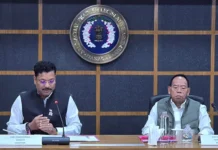ITANAGAR, 11 Nov: The political science department of Himalayan University (HU) here organised a special talk on the theme ‘The Dalai Lama at 90: Legacies and the road ahead’ on Tuesday.
The event was attended by senior researcher from Dharamshala (HP)-based 108 Peace Initiative’s senior researcher Dr Yeshi Dawa, who delivered a thought-provoking lecture highlighting the life, philosophy, and global influence of the 14th Dalai Lama.
Dr Dawa presented a rich and insightful narrative on the Dalai Lama’s journey from Tibet to India in 1959, following the Chinese occupation. He traced the Dalai Lama’s transformation from a temporal leader to a global spiritual icon advocating non-violence and universal brotherhood.
Dr Dawa spoke about the India-China relations, the Dalai Lama’s role in promoting peace and inter-religious harmony, and his lifelong dedication to the Tibetan cause. He further reflected on how the Dalai Lama’s teachings continue to inspire millions worldwide in areas of human rights, ethical governance, environmental sustainability, and education for peace.
The speaker also delved into the legacy of the Dalai Lama’s leadership, explaining how his philosophy transcends national and religious boundaries, uniting people through the shared values of humanity and compassion.
Dr Dawa emphasised that, as the Dalai Lama approaches his 90th year, it becomes even more essential to preserve and propagate his message of peace, dialogue, and moral courage in an increasingly divided world.
Associate Professor Dr Dipongpou Kameiemphasised the importance of studying spiritual and philosophical figures like the Dalai Lama in understanding the intersection of politics, ethics, and humanity. He noted that such discussions are essential for young scholars to broaden their perspectives on peace, compassion, and inter-cultural understanding.
HU Vice-Chancellor Prof Prakash Divakaran in his address highlighted the significance of the Dalai Lama’s philosophy in the present age of global conflict, environmental challenges, and moral crisis. He encouraged students to internalise the universal values of love, compassion, kindness, and non-violence as guiding principles for both personal and societal transformation.
A question-and-answer session followed the presentation, during which students and faculty members actively interacted with the speaker. The discussion brought forth insightful questions related to the future of the Tibetan movement, the Dalai Lama’s global influence, and the relevance of his spiritual values in modern geopolitics.
The event witnessed enthusiastic participation of students, research scholars, and faculty members.


